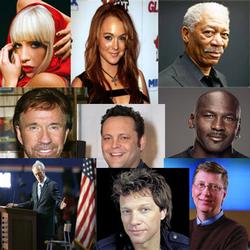Arts and Entertainment
Face Off: Should celebrities endorse political candidates -NO
By Taylor Coe '13
November 1, 2012
Celebrities should not endorse candidates. This is not to say that anyone should prevent them from announcing their support for a political party or candidate in an election—just that, in the ideal media culture, it would not happen.
But, at best, candidate endorsements are empty statements, anyway. See the Democratic reaction following Clint Eastwood’s awkward entrance onto the stage at the Republican National Convention in Tampa. Sure, having Clint behind your cause is more than just chump change, but his appearance as mystery speaker heralded a collective, Democratic sigh of relief, crossing off their list the predicted heavyweights, which ran the gamut from Sarah Palin to a hologram Ronald Reagan. Eastwood and his empty stool ended up being a relief to the Democrats and a mind-boggling gaffe for the Republicans.
But one cannot dismiss celebrity endorsements wholesale. Like Eastwood’s remarkable gaffe, they end up playing an important (but misleading) role in elections. Sometimes it is even the case that celebrities indirectly make endorsements by way of ‘anti-endorsements.’ With regard to popular musicians and their music, we see this circus routine played out nearly every year with candidates’ choice of campaign songs and even their references to popular culture.
Reagan, for instance, was famously lambasted by Bruce Springsteen for his misinterpretation of “Born in the U.S.A.”—a song which bemoans the experience of a Vietnam vet. A few election cycles later, Jackson Browne sued John McCain and the Republican Party in 2008 for the use of “Running on Empty” in a commercial for the Ohio Republican Party. (It should be noted that neither approved the use of the song).
In the past election cycle of celebrity endorsement, there was perhaps no moment more awkward than that in which Rolling Stone reporter Mikal Gilmore prodded Bob Dylan to profess his love for Obama. Gilmore’s odd, quasi-interrogative pursuit of Dylan was all the more striking in that the master songwriter refused to play along. This interview—although it ultimately yielded no official endorsement—nevertheless manages to indirectly highlight the crucial distinction between art and artist.
Dylan, of course, assumed a voice of political change in the 1960s during the Civil Rights movement, but that role was largely assigned to him by his listeners—it was not one that he picked for himself. Gilmore seemed to be under the impression that Dylan’s endorsement of Obama would somehow situate itself alongside his earlier forms of political expression.
Art can often be political in a curious way: it is not political in the way that a stump speech or an op-ed in the newspaper is political. Politics in art is not straightforward. Even art that deals directly with political subjects still is only capable of addressing politics in a glancing manner. The line here between fact and fiction is crucial. You only need to watch the neatly-plotted political drama of Aaron Sorkin in relation to the endlessly complex and layered world of national politics to get the point.
On the other side of the issue, celebrity endorsement can needlessly politicize apolitical art. When Sean Penn endorses Obama, he inflects a certain political flavor into a film like The Tree of Life, which ultimately speaks to a more complicated relation to politics than Vote for Change. Ultimately, this politicization is an unintended consequence, but we cannot pretend that these consequences are not sometimes felt.
So, at the end of the day, who should be making endorsements? If we (idealistically) end up with silenced actors, artists and all the above famous-for-being-famous, then who does that leave us? Well—people whose thoughts matter in a more than cursory, popular way: politicians, journalists, newspapers, thinkers, activists. These are people who impact the political sphere in more ways than simply their ‘endorsement.’ While it is undeniable that certain celebrities (think: not Paris Hilton) can grapple in interesting and intelligent ways with our current political climate, their opinions should not be spoken in the same breath as those of Colin Powell or Bill Clinton.

No comments yet.
Comment Guidelines
Please log in to post a comment